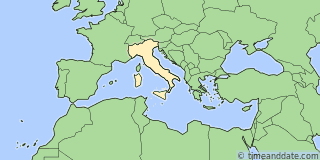2025年3月30日 (日), 2時00分
3月27日 (日)
Forward 1 hour
2022年3月27日 (日) - Daylight Saving Time Started
When local standard time was about to reach
2022年3月27日日曜日, 2時00分00秒 clocks were turned forward 1 hour to
2022年3月27日日曜日, 3時00分00秒 local daylight time instead.
Sunrise and sunset were about 1 hour later on 2022年3月27日 (日) than the day before. There was more light in the evening and less light in the morning.
Also called Spring Forward, Summer Time, and Daylight Savings Time.
More info:
DST Start in Europe 2022
10月30日 (日)
Back 1 hour
2022年10月30日 (日) - Daylight Saving Time Ended
When local daylight time was about to reach
2022年10月30日日曜日, 3時00分00秒 clocks were turned backward 1 hour to
2022年10月30日日曜日, 2時00分00秒 local standard time instead.
Sunrise and sunset were about 1 hour earlier on 2022年10月30日 (日) than the day before. There was more light in the morning and less light in the evening.
Also called Fall Back and Winter Time.
More info:
End of DST in Europe 2022
When Does DST Start and End in Italy?
Italy's DST period starts on the last Sunday of March and ends on the last Sunday of October, together with most other European countries.
One of the First Countries to Use DST
In April 1916, Germany became the first country to observe Daylight Saving Time (DST). Just months after that, Italy followed suit. The country's first DST period began on June 4 of the same year.
After Italy had abolished DST in 1921, the dictator Benito Mussolini revived the measure in 1940, when the country observed all-year DST until November 2, 1942. From 1943 to 1948, the DST schedule was back on track, starting around March or April and ending either in September or October, depending on the year. There was no DST in Italy from 1948 to 1966, when it was reintroduced.
In 1996, Italy adopted the EU’s DST schedule, which the country still follows today.
Daylight Saving Time History in Italy
- Italy first observed Daylight Saving Time in 1916.
- Italy has observed DST for 74 years between 1916 and 2025.
- Previous time with no Daylight Saving Time was 1965.
- See Worldwide DST Statistics
